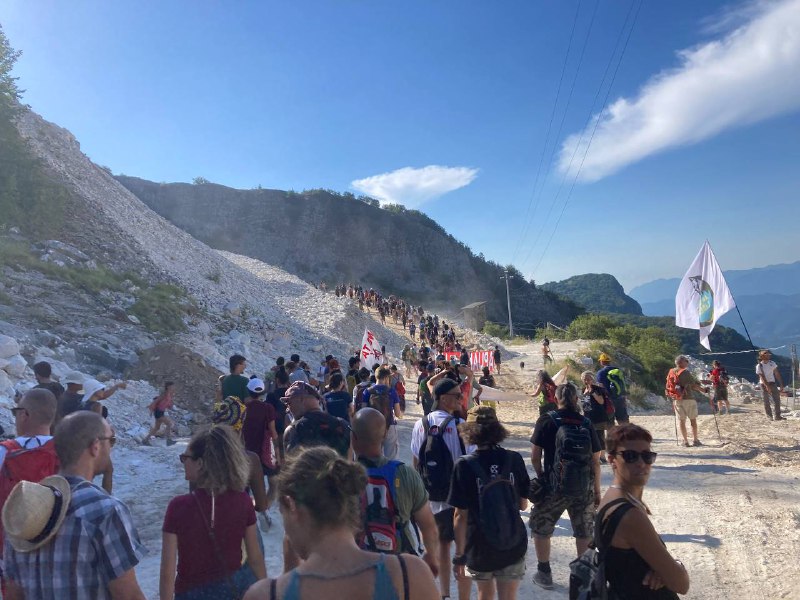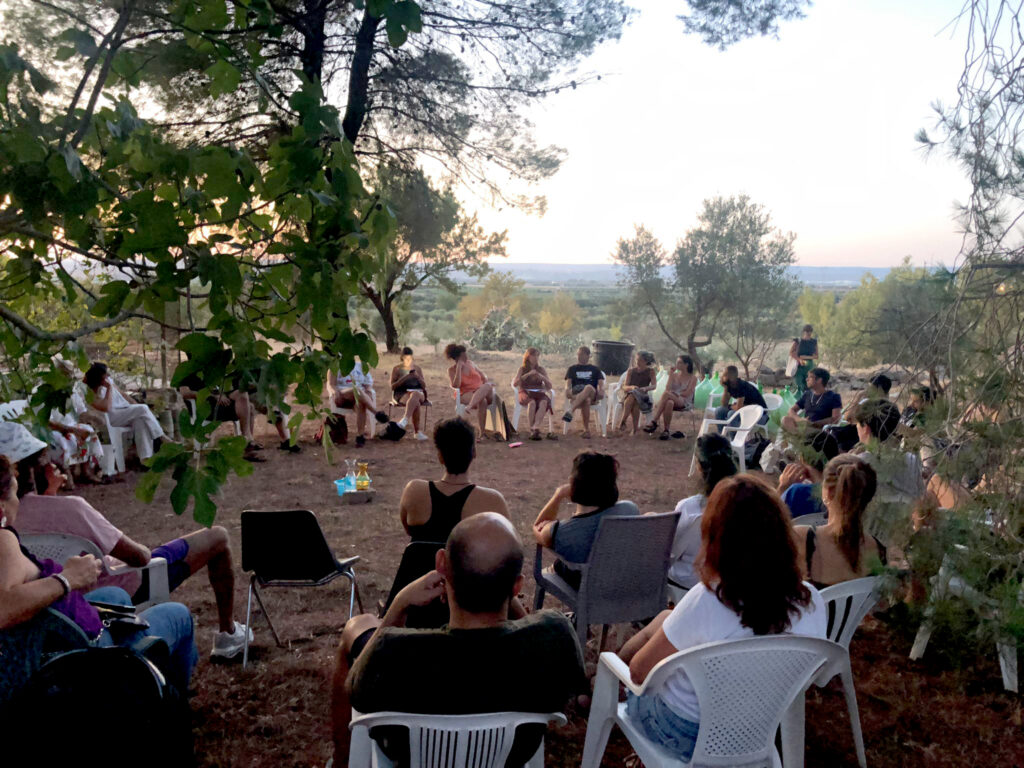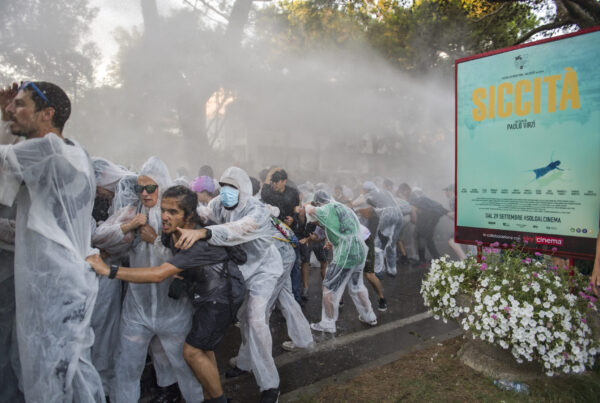By Salem Ghribi
In early 2019 a new form of environmental activism took the global stage. A young composition of mainly students poses a new way of understanding ecology and the wider relationship with political engagement. It’s been three years since then and the summer 2022 has been filled with political camps across Italy.
Since those pivotal moments the new climate justice movement is confronted by historic challenges: not only global warming, but a global pandemic and new bloody wars. Also in Italy, together with the planetary wave, more than a hundred local Fridays For Future committees were born, but not only. Quickly, climate justice took on different shades and, all over the world, new experiences are born, united by the fact of giving top priority to this struggle, starting from different histories and perspectives. In Italy among the new groups born after 2019, in addition to the aforementioned Fridays For Future, there are Ecologia Politica Network, Rise Up For Climate Justice, Extinction Rebellion, and Last Generation.
After three years, the Covid-19 pandemic, and the war in Ukraine, activists from across Italy and the world have come together to discuss and organize for the fall. They decided to do so in a series of camps that spanned the summer and the country, based on the centrality of an urgent discussion about the future of the climate justice movement. These camps began in July with Carsica in the Apuan Alps, then the Climate Social Camp in Turin (at the same time as the European Fridays For Future meeting), the No Muos camp in Niscemi, the Convocatoria Ecologista in Taranto, and finally the Venice Climate Meeting in September. All these camps captured, with different nuances, a fact that has matured in recent years, namely the close relationship between social, economic, political issues and the ecological transition.

The Carsica march on the Apuan Alps, July 16 2022. Credits: Athamanta
During Carsica, among the many important discussions that animated the three days, we reflected on the difficult relationship between those working in polluting supply chains and environmentalist claims, focusing, in particular, on the evisceration of the Apuan Alps by the marble industries in Massa and Carrara. The specific context brought out the contradictions inherent in Italian “quality” productions, recognized and appreciated around the world, narrated as the wealth of the territory, but often enjoyed only by a small minority of capitalists, Italians and otherwise. The climate justice movement’s reflection on the issue is wide-ranging, but it raises at least one fundamental point: we must absolutely reject occupational blackmail, which puts those who work in front of the obligation to choose whether to die of starvation or illness. To do this, it is also necessary to employ a class perspective, showing that the struggle is not between workers and the environment, but between workers and the environment on one side and those who extract resources and value from them through exploitation on the other. The contradiction between labor, health and the environment is in fact internal to capitalist relations of production; the goal of the climate justice movement must therefore be to overturn those uneven relations.

Climate Social Camp, Torino, July 25-29. Artwork by Zerocalcare.
Many of these reflections then continued to a larger extent at the Climate Social Camp in Turin. This was the occasion where all the main ecological organizations, thousands of activists from all over Europe, gathered at the same time of the second European meeting of Fridays for Future, together with activists from MAPA countries (Most Affected People and Areas). The four days camp tackled the issues that have always run through the climate debate: the labor-environment-health relationship, the intersection of ecological and transfeminist struggle, the role of the global South in the ecological transition-as well as issues such as energy, water, and quality and sustainable food production and provision.
Focusing on the issue of labor, The GKN in Campi Bisenzio is certainly an example. Workers at this factory have demonstrated the possibility of a concrete relationship between workplace struggles and ecological struggles, starting with this year’s large demonstration in collaboration with Fridays for Future on March 26 in Florence, then continued on the dates in Bologna on October 22, and Naples on November 5. GKN’s struggle sets a minimum possible goal of convergence and alliance between workers and climate activists, between productive and reproductive struggles and this is happening not only in Tuscany, the region where GKN insists. In fact, the dockworkers of Genoa are a further example of this, who on several occasions have demonstrated that labor poses social responsibilities. Their refusal to lend their arms and forces to load weapons onto ships bound for theaters of war has forcefully raised the issue of democracy in the workplace, forcing the question: what do we produce, how do we do it, and for what purpose?
In this sense, even the debate about the ecological transition has been addressed more radically than a few months ago. The relationship between the labor movement and climate justice has been deeply problematized, going so far as to point to a mutual empowerment of the two. For workers, this is a twofold opportunity: on the one hand, an avenue for greater democratization of workplaces, where those who work have a right and a duty to be involved in the economic, social and environmental plan of their workplaces; on the other hand, it is noted how the participation of the ecological movement allows for a move away from the merely vertencial and wage level, expanding union struggles in the direction of political battles and advancement for all of society. For the ecological movement, on the other hand, the relationship with workers is not only desirable but necessary. Indeed, a top-down ecological transition is not possible and desirable given the enormous social costs that it would entail. Moreover, on this point, strike as political praxis was reflected upon extensively during the Turin camp: productive strike, social strike, reproductive strike. The so-called students’ strikes for the future can be framed as social strikes. These, while successful in bringing the climate issue to the forefront of the public debate, have an objective limitation, unless coupled with productive and reproductive strikes, they turn out to be blunt strategies, certainly important for moving the public consciousness and showing the urgency of the climate emergency, but insufficient to overturn power relations.
Power relations were also discussed in relation to MAPAs, who have repeatedly expressed their impatience with the North-western climate movement’s communicative approach, which they considered ineffective. Indeed, the large participation by people from territories devastated by ecocidal capitalism has forced a series of reflections around the movement’s perspectives, practices and standpoints. Their contributions brought to the European climate debate the fundamental themes of privilege, decoloniality, Eurocentrism, of debt cancellation, delocalization, and the cost of ecological transition, including its massive demand for raw materials. Their participation deepened the critique of the idea that there can be a universality of practices – a debate that has already begun at our latitudes and is becoming increasingly central.
Practices of struggle cannot be disconnected from the territory in which they are carried out, the social, political conditions, of democratic agility, the degree of patriarchal oppression and so on. From these premises, the position of MAPA peoples emerged clearly about the need to weave relationships that are not of ’empty’ solidarity or Eurocentric paternalism, but instead build the possibility of meeting on common struggles and horizons. I believe that a relevant tract of the Turin camp is the radicalization of the climate justice movement, particularly in Italy. Indeed, if one looks at the trajectory of the last three years, one cannot fail to notice the growing complexity of the movement. Looking at the questions posed by Fridays for Future, it is undeniable that the positions that have emerged in recent months since the Climate Social Camp are clearly evolving from those of a few years ago. The consciousness-raising with respect to the anti-capitalist perspective, the decline of the demand for institutional politics’ support, the radicalization on the issues of labor, ecological transition, and critique of the global development model denote a political growth of such experience. On these systemic contradictions the climate justice movement has managed to develop an advanced discourse, succeeding-as on other fronts-to produce a radical critique.
A further evolution of the analysis then started from the restitution of the complexity of the war in Ukraine, which has shuffled the cards of the Italian government’s priorities with respect to the ecological transition, reopening coal-fired power plants and focusing on regasification plants with the aim of using liquefied gas from overseas. It was from this premise that the No Muos camp in Niscemi, Sicily, addressed the theme of war and its relationship to climate change, starting from a place devastated by the presence of the Muos system, a giant radar telecommunications apparatus owned by the United States. Among the goals of this appointment was the need to create a convergence with climate justice movements in order to build real, grassroots opposition to the military occupations and the war industry, which are responsible for a huge amount of climate-altering emissions, as well as environmental and social disasters, as in the case of the small town of Niscemi.

Convocatoria Ecologista in Taranto, August 26-29. Credits Ilaria Lupo
The camps that closed this summer of struggle were those in Taranto and Venice. Co-organized by different realities in Southern Italy, the Convocatoria Ecologista in Taranto responded to the need to build spaces of confrontation, sociality and emancipation that from care and political autonomy will create the components of a new lexicon. This three-day event recognized spaces of care and autonomy as the grounds upon which to interconnect wounds, violence, desires and needs that have always been invisibilized in every margin. In the South of Italy, where communities are blackmailed by the colonial power embodied by Northwestern institutions and the economic structure they protect. The Venice Climate Camp, on the other hand, gave continuity to the European debates begun at the Turin meeting, addressing the issues of decoloniality and labor, bringing into the spotlight of the Venice Film Festival – within reach of fire hydrants! – the climate struggle.
Salem Ghribi is is a doctoral candidate at CNR – ISTEC. He is currently an activist with Ecologia Politica Network and has been active in Fridays For Future as well as in struggles for the right to education, labor and housing. He has written articles on the pandemic and the climate crisis for Jacobin. This piece was firstly published in Italian on Le Parole e le Cose.
Top (feature) image: Venice Climate March, September 10, 2022. Credits: Dario Fichera. Thanks to Venice Climate Camp and Rise Up for Climate Justice



